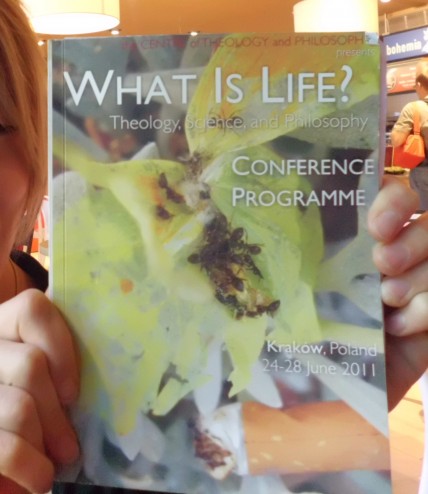
“What is Life?” Ho hum, where does one start to answer this question? The What is Life? conference in Krakow, 24-28th June, which aimed to bridge philosophical, theological and scientific insights to this question.
I started with what I see to be at the roots of our understanding of life: our stories.
We understand life ‘by locating ourselves with the larger narratives and metanarratives that we hear and tell, and that constitute what is for us real and significant.’[1]
Philosophy, Theology, Science, History, Theories of Economics and Politics …. They all tell a different story about life, explaining what distinguishes the live from the dead, humans from animals, plants from inanimate matter, atoms from their protons and electrons.
The different stories draw from different languages, refer to different layers, different systems, and emphasize different sources of agency and power.
I was to speak about the history and current state of the story of life told from a “panentheist” perspective, and how this relates to peace. This topic deserves a blog entry of its own so I won’t go into it here.
At the conference I kept coming back to a few questions, based on the analogy of each argument being a story:
– “who is telling the story?”
– “on what is your story based?”
– “which stories bring us closer to understanding Truth, and which lead us away from it?” and, most importantly,
– “which stories are more useful, more likely to bring about positive conflict, than other versions of the story?”
I found stories that started from a position of apologetics – for example a desire to defend a particular interpretation of the Bible – more restrictive and less inclined to lead to growth toward truth.
Stories drowned in incomprehensible jargon debating the ins and outs of minds of other philosophers and theologians occasionally brought my eyes to a glaze. I wrote down some names and ideas, planning to look up some day and see if there’s anything useful once the language barriers are broken through.
On the other pole of the continuum, I understand that stories based on new ideas without grounding in the history of ideas are inclined to be fickle.
The stories that seem most useful, and most conducive to bringing minds closer to understanding “Truth”, are those that enter with ideas grounded in something, but which are held open to other ideas that are grounded in different cultures or have different philosophical/theoretical roots.
Every presentation I attended seemed to have something to teach me, whether or not I understood the entire argument or point the presenter was trying to communicate.
Life – in all its complexity, as understood in different languages, from different perspectives, is an interesting story, both as it is lived, and as it is told.